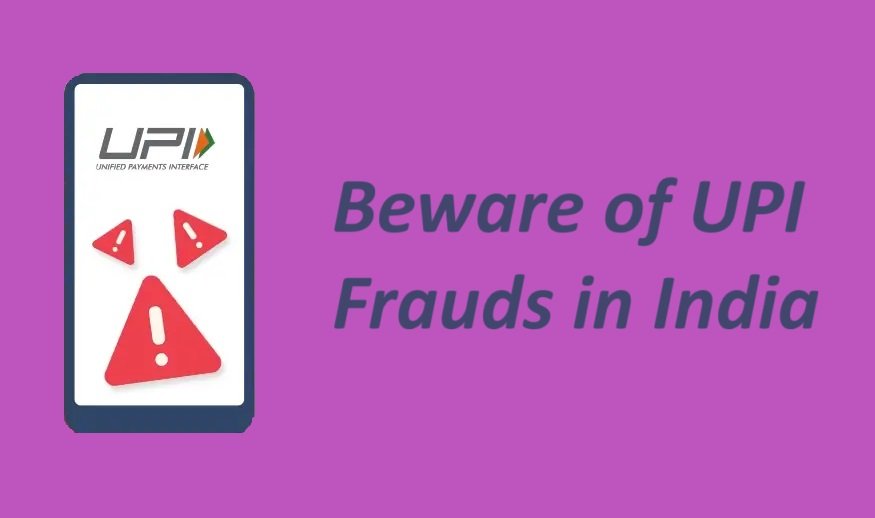Beware of UPI Frauds in India
What is UPI Frauds?
In recent years, Unified Payments Interface (UPI) has emerged as a revolutionary payment system in India, providing hassle-free and speedy money transfers. With its convenience and ease, UPI has become an integral part of conducting everyday transactions for millions of Indians. However, like any digital platform, UPI is also not immune to fraudulent activities. In this article, we will discuss in detail what UPI frauds are, how to beware of it and what are the essential tips to protect yourself from becoming a victim of UPI fraudsters.
One of the most common types of UPI fraud is phishing, where fraudsters impersonate a legitimate UPI app or payment gateway to trick users into submitting their sensitive information, such as their UPI PIN or login credentials. These fraudsters often send fake emails or messages that appear to come from the user’s bank or UPI app provider, asking them to click on a link and enter their details. Once the user falls into this trap, the fraudster gains access to their UPI account and can make unauthorized transactions.
Phishing: Fraudsters impersonate legitimate entities or send misleading messages, emails, or SMS to trick users into revealing their UPI credentials, such as UPI PIN, Virtual Payment Address (VPA), or OTP (One Time Password). Send a call.
QR code scams: Scammers create fake QR codes or tamper with genuine codes to trick payments into sending money to their accounts instead of the intended recipient.
Remote Access: Fraudsters gain unauthorized access to a user’s device or UPI app through malware or phishing links, allowing them to initiate fraudulent transactions without the user’s knowledge.
Red Flags to Check UPI Frauds
It is important to recognize the potential signs of UPI frauds to protect your finances and personal information. Here are some red flags to be alert for:
Unsolicited requests: Beware of unsolicited messages, emails or calls asking for your UPI credentials or personal information. Legitimate organizations will never ask you to reveal sensitive details through such means.
Urgency and pressure: Fraudsters often create a sense of urgency or panic to take immediate action, such as claiming that your account has been compromised or offering attractive deals with a limited time offer. Take a step back and verify the authenticity of such communications before responding.
Unusual transactions: Regularly monitor your UPI transaction history for any unauthorized or unrecognized payments. If you notice any suspicious activity, immediately report it to your bank or payment service provider.
Mismatched URLs or QR codes: Before scanning QR codes or clicking on links received through messages or emails, double-check their authenticity. Fraudulent QR codes can redirect you to malicious websites designed to steal your information.
Unwanted app downloads: Avoid downloading UPI apps or software from unofficial sources or pop-up advertisements. Stick to trusted app stores and verify the credentials of the developer before installing any application.
Unrecognized apps: Download UPI apps only from official app stores like Google Play Store or Apple App Store. Avoid downloading apps from third-party sources as they may contain malware or be fraudulent.
Please explore my articles related to awareness of online Fraud.
Beware of Fake Government Scheme Scams in India
Defend Yourself against OTP Fraud
Protect Yourself to UPI Fraud
Preventing UPI fraud requires a combination of caution, awareness and proactive measures. Here’s how you can protect yourself from potential threats:
Secure your UPI credentials: Never share your UPI PIN, VPA or OTP with anyone, including friends, family or purported customer support representatives. Keep your login credentials confidential and avoid storing them digitally or in easily accessible locations.
Enable two-factor authentication (2FA): Opt for additional security measures like biometric authentication or transaction passwords to add an extra layer of security to your UPI transactions.
Stay informed: Educate yourself about the latest UPI fraud trends and common tactics used by scammers. Stay updated on security alerts and advisories issued by your bank or regulatory authorities.
Use official channels: Download UPI apps or updates only from verified sources, such as official app stores or the respective bank’s website. Avoid clicking on suspicious links or attachments in emails or messages, especially those that claim to offer rewards or instant notifications.
Monitor transactions regularly: Review your UPI transaction history regularly to detect any irregularities or unauthorized payments. Report any discrepancy or fraudulent activity to your bank immediately for immediate action.
Secure your device: Install reputable antivirus software and keep your device’s operating system and applications updated with the latest security patches. Avoid rooting or jailbreaking your device, as this may expose you to additional security risks.
Exercise caution online: Practice skepticism when making online transactions or interacting with unfamiliar parties. Verify the legitimacy of websites, merchants or individuals before sharing any sensitive information or making payments.
By being vigilant and adopting proactive security measures, you can reduce the risk of becoming a victim of UPI fraud and ensure a secure digital payments experience. Remember, when it comes to protecting your financial assets and personal information, caution is always the best defense.
Conclusion:
UPI fraud can harm people’s money and privacy. So, it’s crucial to be careful and smart about using UPI. Even though UPI is easy and quick, bad people try to trick others for their benefit. To stay safe, it’s essential to know the signs of UPI frauds, like strange messages or urgent requests for money. By being cautious and learning about fraud, we can protect ourselves better. Also, banks and technology companies need to work together to make UPI safer for everyone. They should make sure their systems are secure and easy to use. In short, while UPI is great for fast payments, we should be cautious to keep our money and information safe. With care and cooperation, we can make digital payments safer for everyone.

